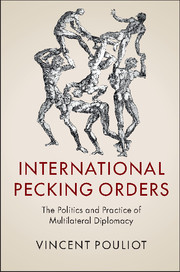Book contents
- Frontmatter
- Contents
- List of figures
- List of tables
- Preface and acknowledgments
- List of abbreviations
- Introduction: All the world's a stage
- Part I Situations
- Part II Dispositions
- 3 The diplomatic sense of place
- 4 A working consensus: the negotiation of the 2010 Strategic Concept and the NATO pecking order
- Part III Relations
- Part IV Positions
- Conclusion: The “miracle” of multilateral pecking orders
- Appendix: Research design, methods and data
- References
- Index
3 - The diplomatic sense of place
from Part II - Dispositions
Published online by Cambridge University Press: 05 March 2016
- Frontmatter
- Contents
- List of figures
- List of tables
- Preface and acknowledgments
- List of abbreviations
- Introduction: All the world's a stage
- Part I Situations
- Part II Dispositions
- 3 The diplomatic sense of place
- 4 A working consensus: the negotiation of the 2010 Strategic Concept and the NATO pecking order
- Part III Relations
- Part IV Positions
- Conclusion: The “miracle” of multilateral pecking orders
- Appendix: Research design, methods and data
- References
- Index
Summary
Chapter 2 showed that the social situation within which practices are enacted generates opportunities and places constraints on the struggle for competence. But the working consensus that grounds interaction orders is not the only force that organizes the emergence of pecking orders in practice. In Part II of the book, I want to show that social structures are also located within ourselves. We generally think of structures as somehow floating above our heads. And yet, building on Goffman, I theorize the micro-mechanism of the pecking order as the “sense of place.” As a basic diplomatic skill, the sense of place allows delegates to figure out the distribution of ranks and roles around the multilateral table. This practical feeling is both constraining – as a sense of limits – and enabling – as a display of socially recognized competence. Take, for instance, the advice that Colin Keating (an experienced former New Zealand diplomat) gives to incoming small elected members of the UN Security Council. In order to exert some influence, he writes, a competent delegation from a small country “absolutely shuns grandstanding.” For Keating, standing may be achieved by smaller delegations by striking a delicate balance between taking initiatives and contributing to the debate, on the one hand, and refraining from exaggerating one's importance and role, on the other. As they struggle for practical mastery, diplomats self-regulate their moves through the sense of place.
The diplomatic sense of place relates not only to individual delegates but also to the countries being represented at the table. At the dispositional level, practical mastery for the multilateral diplomat consists of skillfully embodying the state – making the most of its standing while making up for its lapses. Although some aspects of practical mastery accrue to individual practitioners, others would seem to attach to corporate actors. This is due to the basic nature of diplomacy, which is about representing states. While diplomats show unequal dexterity in working with (or around) their country's standing, when it comes to defining what counts as valued markers, they are at the receiving end of political dynamics that mostly escape their control. On the one hand, diplomats must put up with the moves that governments make, for instance in providing (or not) certain resources to the IO at hand. This theme I will explore at length in Part IV (Chapters 7 and 8).
- Type
- Chapter
- Information
- International Pecking OrdersThe Politics and Practice of Multilateral Diplomacy, pp. 71 - 85Publisher: Cambridge University PressPrint publication year: 2016



